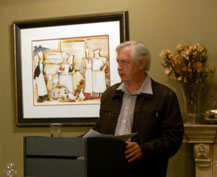Latest News Archive
Please select Category, Year, and then Month to display items
29 March 2022
|
Story Teli Mothabeng
|
Photo Supplied
![]() Philmon Bitso, Student Recruitment Officer, with the top-10 cohort of the class of 2021 Free State Star of Stars.
Philmon Bitso, Student Recruitment Officer, with the top-10 cohort of the class of 2021 Free State Star of Stars.
The Department of Student Recruitment Services at the University of the Free State (UFS) hosted its annual Free State Star of Stars competition at the Amanzi Private Game Reserve during the first week of March. The event saw some of the brightest young minds in the Free State inducted as UFS first-year students into this year’s top-10 cohort for the competition. This marks the first Star of Stars event since the beginning of the COVID-19 pandemic.
.jpg?Status=Master&sfvrsn=d7324e20_1)
This new cohort consists of a dynamic group of academically gifted students from Quintile 1-3 schools in the Free State who are currently enrolled for different UFS academic programmes, ranging from Medicine, Law, Education, and various Bachelor of Science courses. Many of these students had to overcome insurmountable challenges to perform as well as they did in their Grade 12 academic year and to become part of the top-10 cohort for the class of 2021. Due to the COVID-19 pandemic, the Department of Student Recruitment Services was forced to take a different approach to celebrate these deserving students; consequently, a weekend-long induction camp was the substitute for the annual gala dinner.
Apply for the 2022 Free State Star of Stars competition
The UFS realised the need to establish a platform that recognises and celebrates the diverse and, in most instances, difficult circumstances that disadvantaged schools (Quintile 1-3) are facing. Consequently, the Star of Stars competition was developed and established in 2016. This competition provides disadvantaged Grade 12 learners from all districts in the Free State an opportunity to showcase their excellence, while motivating them to aspire to achieve more.
Afrikaans place names were not only given by Afrikaner people, says professor.
2012-09-25
 |
Prof. Peter Raper delivering his lecture on South African place names.
25 September 2012 |
Prof. Peter Raper, honorary professor at the Department of Linguistics and Language Practice, delivered a public lecture in Clarens earlier this month. The theme of the lecture was “From Stone Age to GPS: The fourth edition of the South African Place Names Dictionary”.
Prof. Raper shared the historical development of the project as well as the challenges and other interesting observations associated with the topic. He elaborated on the dramatic change in the focus of his research on place names in South Africa.
It was previously assumed that all of the Afrikaans place names were given by the Afrikaner people and that changing these place names was consistent with the mandate of the South African Geographical Names Council (SAGNC) to transform place names. Prof. Raper said more in-depth research revealed that a significant number of place names are actually translations of original San names – into Afrikaans, Khoi and the Bantu languages. He told the audience that given the constitutional stipulation that no cultural group’s heritage may be removed, this discovery calls into the question the modus operandi of the SAGNC.
Prof. Raper’s lecture was part of the conference programme of the Third International MIDP IV Symposium that took place on the Qwaqwa campus. The MIDP (Multilingual Information Development Programme) is a project sponsored by the Province of Antwerp. The theme for this year’s symposium was “Multilingualism for Empowerment” and was presented in collaboration with the University of Antwerp.